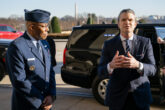December 05, 2016
Reforming the National Security Council Staff: It’s All about Trust and Accountability
President Trump’s national security team has to be ready to hit the ground running in January. The list of challenges is long: a resurgent and aggressive Russia, a rising China, a belligerent and nuclear capable North Korea, an Iranian government inserting itself throughout the Middle East, Syria and international terrorism. While a new administration will be eager to address these challenges, one fact is evident: Even the best national security strategy will fail if it does not have the right structure to see it through. As part of my experience as a senior military fellow at a Washington think tank, I have had the good fortune to personally meet with many former Cabinet-level leaders to hear their candid views about our national security process and their message is crystal clear: President Trump needs to reform the National Security Council (NSC) process by shrinking its White House staff and placing trust and accountability back in the hands of his cabinet and NSC principles.
The past two administrations have consolidated national security decision making in the White House by micromanaging the implementation and execution of policy from the NSC staff. President Trump does not need to take a year to find out what previous administrations already recognize; the interagency decision-making and -execution process is broken. Now is the time for our new president to demonstrate trust in Cabinet-level leaders and their departments by cutting his own staff and allowing those NSC principals to advise him and then implement and execute the final policy. The NSC principals, not the NSC staff, should then be held accountable for the implementation and execution in their organizations. The president can and should do this on day one.
Read the full article at Defense News.
More from CNAS
-
National Security Has a Human Capital Problem and There’s No Fast Way Out
National security doesn’t really exist without the military forces and supporting civilians to carry it out. Recruitment remains a problem for the armed forces. And there’s a ...
By Katherine L. Kuzminski
-
The Department of Defense’s Breakthrough Nuclear Moment Risks Slipping Away
Unless they act, the Department of Defense’s breakthrough nuclear moment may vanish before it really happens....
By Will Rogers
-
Sharper: National Security Human Capital
U.S. national security depends on the nation’s ability to leverage the expertise of uniformed warfighters and the highly skilled civilian professionals who develop and impleme...
By Charles Horn & Taren Sylvester
-
Hegseth Brings the Culture War to Combat
The fundamental challenge of military leadership lies in creating cohesive teams that can work together in an environment of mortal risk and, when called upon to do so, use le...
By Dr. Jason Dempsey




